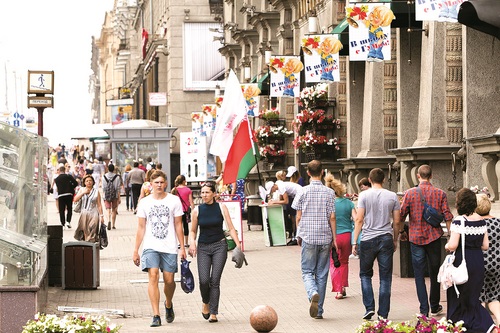The pre-election race is accelerating. Parliamentary candidates can be nominated in three different ways — by signature collection, through promotion of representatives of labour collectives, and through political parties. The first two mechanisms have been long used by campaign participants, while the third was out of use until recently.

Election campaign in full swing
The latter is organisationally complex, as only the supreme body of a party can nominate candidates from this party. As a rule, this body is represented by the assembly. This method, however, has an advantage. From now on, political parties are not restricted from nominating their candidates in constituencies where they don’t have regional units.
The Secretary of the Central Election Commission (CEC), Nikolai Lozovik, comments, “Previously, we did have this restriction, but it no longer exists. A political party has the right to nominate one parliamentary candidate for each of the 110 constituencies, given it has enough people.”
The Liberal Democratic Party intends to use this right to the full extent. On July 9th, it presented its potential candidates and their future pre-election programmes. Currently, it is conducting an assembly in Minsk. One of its organisers tells us, “Our party is nominating 110 parliamentary candidates for the elections — one for every constituency. Each candidate will be individually considered at the assembly.”
The Belarusian Patriotic Party has already held an ad hoc assembly, nominating 20 candidates. Another three members of the party will be promoted through signature collection, 92 party members have been appointed national observers, and another 38 have been assigned to constituency electoral committees.
Why have they decided not to cover all constituencies? The party explains, “Initially, we planned to nominate more party members. We had a month-long discussion and finally decided to nominate the best of the best. We’re relying on quality rather than quantity.”
The Chair of the Central Election Commission, Lidia Yermoshina, counts that, on average, 4.5 people claim each parliamentary seat. It’s not hard to project that competition will increase after parties nominate their candidates. Competitiveness and democracy are, traditionally, core features of our pre-electoral campaigns. Having a choice is vital.
MEANWHILE
Nomination of candidates for Council of the Republic membership began on 21st July.
Presidiums of district and city (towns of regional subordination) Deputy Councils, district and city executive committees, Minsk City Council Presidium and Minsk City Executive Committee are to nominate candidates to the upper chamber of Parliament. According to the schedule of events, relating to preparation and conducting of the election to the upper chamber of Parliament, nomination of candidates for the Council of the Republic will continue until August 19th.
By Alexey Fedotov











